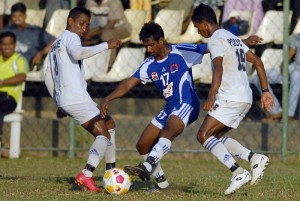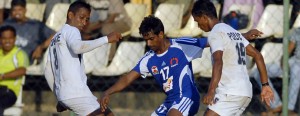Football’s lessons from the past
View(s):By Subhani Hassimdeen
Football has, for some considerable time, been popular sport among the people of this country, just as it is one of the most popular sports in other parts of the world. It has the particular virtue that it is able to arouse a great deal of enthusiasm not only among the players but among the spectators as well. In this country it has not only helped to improve the physical well – being of our people but served to weld the different communities and class of people together, thereby made an appreciable contribution to the task of nation building.
The Ceylon Football Association was formed in 1939 as the main controlling body for soccer in this country and the forty eight affiliated leagues round the island, was the base for the development and growth of football. They therefore, deserves the grateful thanks of the people for the every valuable service it has done during the period 1939 to 1970, During this period, due to the efforts of the controlling body and its, affiliated Leagues which had the assistance of many devoted persons who voluntarily gave their time and energy to the game considerably

By introducing football professionalism by few short-sighted money-men in our country ruined the true concept of this sport.
In addition to the valuable contribution made by the Armed forces and police which I elaborated in my last article in the Sunday Times dated 10.02.2013, it is fitting to record the contribution made to football by other leagues. The Mercantile Football League, the Government Services League, the Nationalised Services League and the Playground League, played an important role not only to development of the game but were able to produce renowned footballers to represent the national team. They are in the calibre of Peter Ranasinghe, Andrew Fernando, Wipulasena, Synoon, K.D. Somapala, Tom Deen, Eric Perera, Bagoos Saldin, Panditha, Hassimdeen brothers –M.M, M.S, and M.F, Hemachandra, Hamzath, Jayatissa and John Fernando. From the Government Services and Nationalize Services League – Lionel Peiris, P.D. Sirisena, A Zainulabdeen, Edward Wickremasuriya, Issadeen, S.M. Noor and Ananda Peiris
From the playground League – Piyadasa Perera, M.A. Ameer, B.H. Sally, P.H.S. Albert Dinapala, T.S. Samath, P. Ananda, Tissa Kodituwakku, B.D. Preena and Chandradasa.
The Mercantile League and the Government Services League have a history much longer than that of the National Controlling Body for instance the Mercantile League was formed in 1918 and the Government Services League in 1920.
Administrators have been many, who sacrificed their time energy and wealth in the service of football from these Leagues, however let me mention a few distinguished personalities who associated with the game. From Mercantile League comes – Charles Heenitigala, T.H. Jumar, Kingsly Amarasekera, Daya Tennekoon, J.P.N. Fernando, Reggie Jayawardena, Lucian de Zilva, Michel De Soysa and Pandithage. From the Public Sector there is – P.M.S. Wijesundaram, M.D. Fernando, Katugahage and T. Amith. From the Playground League there names like – V.A. Sugathadasa, M.H. Mohamed, D.H. De Silva, Jim Ranasinghe and Anurudha Polonowita.
The Mercantile Football League with its long football history, was a vibrant and rich League which organized its annually knockout and League tournaments effectively and systematically from division A to division E , thereby encouraged most of the private sector companies in the country to participate in their football tournaments regularly with much interest and enthusiasm. Some of pioneers who participated in the initial stage are- Rowlands Co Ltd , Cargills, Nestles, Colombo Commercial Co, Browns, Walkers, Wellawatte Spinning & Weaving Mills followed by Ceylon Cold Stores, Liptons, Bata, Dimos and to name a few. From the private banks – Grindlay’s Bank, Commercial Bank, State Bank of India, Hong Kong Bank and Hatton National Bank.
In the F.A. Cup Tournament conducted by the Ceylon Football Association – Rowlands Ltd became Runner – up in 1953, Cargills in 1957 and Wellawatte Spinning & Weaving Mill in 1960 and 1961. The Mercantile League won the Inter – League championship conducted by the Controlling Body in many occasions. I had the privilege of captaining the Mercantile League in this tournament in two cup finals, held in 1970 and 1971 respectively.
During the period 1950s and 1960s, the mercantile establishments and banks offered permanent jobs to our soccerites with the aim of building up their soccer team, to perform well in the tournament conducted by the Mercantile League. This not only helped the footballers to improve the playing standard also paved way to build up their future in life. I am one of those lucky soccerites who started my career as a clerk working to a mercantile establishment and retired as an Assistant General Manager.
By introducing the so called football professionalism by few short – sighted money – men in our country ruined the true concept of this sport. Even few mushroom private organizations too contributed to this misery. They hired and fired poor soccer players according to their will and fancy. Due to this, the firms which were playing with their permanent employees gradually gave up football or have attached less importance to the sport giving prominence to games like cricket, rugger and basketball. This unfortunate phenomenon started in the mid – seventies with the quality of leadership and competence diminishing conspicuously in the Mercantile League.
The Play grounds League in the city made its impact on the game during the period 1950s to 1970. Football was taught particularly to the children of the poorest of the poor, in the many parks and fields that came under the local authority. The Municipal playgrounds in fact, became the base for the growth of the sport in Colombo, while most of the local authorities in the principal cities and towns elsewhere followed Colombo’s lead.
Though the Government Services League and the Nationalised Services League initially were activate in soccer, now runs its affairs in a low gear or virtually dead due to poor administration and also due to lack of financial and technical assistance either from the Controlling Body or from the relevant authority.
With the peerless tradition the game has had and the equally enviable record of more than 100 years of its existence. It is high time that the Ministry of Sport and the Controlling Body take stock of the past on the basis of experience already gained to lay down proper and effective plans for the future, without allowing this popular sport to deteriorate and lose its popularity any more.
– The writer is a Former National Football captain & National Football Coach

Follow @timesonlinelk
comments powered by Disqus



















